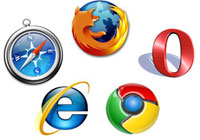 Way back when the internet was still in it’s baby shoes, the only options for web browsers were Internet Explorer and Netscape. Thankfully things have changed and today you can choose a web browser according to your own needs – whatever they might be. We made some notes so you can have more time to surf the net.
Way back when the internet was still in it’s baby shoes, the only options for web browsers were Internet Explorer and Netscape. Thankfully things have changed and today you can choose a web browser according to your own needs – whatever they might be. We made some notes so you can have more time to surf the net.
Nowadays most browsers are more than adequate. The leaders in the race, Google Chrome, Firefox and Internet Explorer, are all packed with handy functionalities and on par with new developments. In the end it all depends on what you prefer.
The most important requirement is probably speed and here it seems as if Google Chrome is taking the lead. With “Chrome Instant” you see the pages you are looking for even before you’ve finished typing the address or title. An application that thinks ahead – literally! Chrome is the only browser with a built-in Flash-player and pdf reader. It also handles HTML5 the best of all browsers and with it’s new hardware acelaration it’s increasingly becoming the popular choice.
However Google Chrome is not the only fast browser. Internet Explorer 9 gave Microsoft’s fading browser a much needed need boost, with JavaScript speed comparable to Chrome, and even started its own performance improving trend—graphics hardware acceleration. IE9’s Javascript is comparable with Chrome and maybe IE9’s greatest advantages is it’s integration with Windows 7. You can also permanently “pin” websites on your taskbar – a handy extra if you don’t like using bookmarks. Just remember you need at least Windows 7 or Vista to run Internet Explorer 9.
Do you want to synchronise all your bookmarks, settings and internet history seamlessly? Them Firefox is for you. It can even sync with it’s own mobile Android version. Firefox also has the most innovative way of organising a lot of tabs with it’s panorama grouping function. Firefox’s startup speed, memory usage and security has improved quite a bit over time and can keep up with any of the other browsers.
If you want to have a look at the detailed statistics of each browser’s performance, read more here.
SOURCE: www.lifehacker.com

